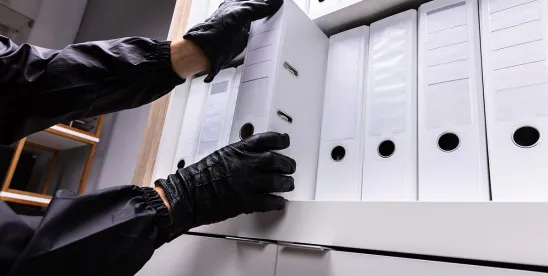In this hot labor market, businesses have been laser-focused on hiring and retaining talent. While increased employee mobility leads to some exciting hires, it also means some workers are leaving for new opportunities. When employees depart, it is critical that employers make sure that they leave empty-handed. By being proactive, businesses can protect against theft of trade secrets and other confidential information.
Protecting against information theft starts at the time of hire. Many companies have confidentiality policies and agreements in place, and ask new hires to sign off on these documents. This is a great first step — but it is not enough, particularly for employees with access to key information. Management, Human Resources, and other leaders should discuss confidentiality obligations both among themselves and with members of the workforce. Highlighting and discussing these policies helps drive home their importance.
When personnel turn in their resignations or when they are asked to leave, the conversation must take place again. Show them the documents they have signed. Give them a copy and ask them to show such records to their next employer. Talk to them about what the documents mean — say it out loud.
We remind you that you are not allowed to take any of our information with you, even if you worked on it or help create it during your time here. If you have anything with you, if you have any emails or documents on your computer, or if you find anything at home, we will need that back. Call me and I’ll help you arrange it.
By having this conversation, you help eliminate honest errors. Often employees take data because they view it as theirs — they made the spreadsheet or they helped develop the technology. They just don’t know it is wrong. By communicating openly and in a non-combative way, you give the employee an opportunity to come clean and return any proprietary information before it becomes a problem. In an exit interview, it is often helpful to have departing personnel sign off that they have not taken anything with them.
The next step is to trust — but verify. An employee with access to mission-critical information is likely to have a broad computer and system access. It is a good idea to keep their computer in storage for a while before reissuing it to another employee. In addition, the person’s email box should be archived. If you learn the employee went to a direct competitor, you may want to be able to view the individual’s access such as downloads or other methods of carrying away electronic data. For personnel with access to core technology or trade secret information, it may be wise to keep the computer for a longer period, or even copy the hard drive, before returning the computer to service.
Finally, if you find an employee took the information, act fast. There are many remedies available to respond to theft of information, but the longer the information is out in the marketplace, the harder it is to protect. By paying attention to where employees work next, you’ll be better prepared to spot potential unfair competition before it gets out of hand. Don’t underestimate the value of communicating with your remaining employees. If you are forced into action to protect your information, let the team know what you have done. Convey the result in a way that is positive and not threatening, and be clear that you are all on the same team. But do help your remaining team learn from the cautionary tale.
Employee departures in this market are inevitable. A thoughtful approach to making sure your business information doesn’t leave with them is invaluable.




 />i
/>i

